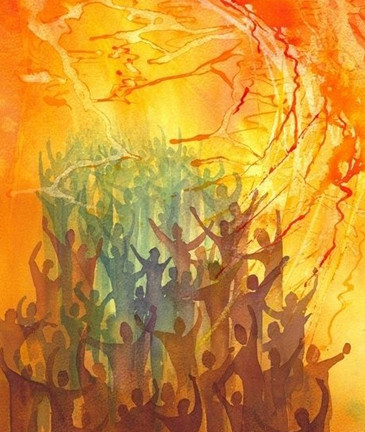Without the Spirit there is no church. Without the Spirit there is no memory of Christ. Without the Spirit there is no grace in our lives and no hope for our future. We see signs of our need for the Spirit everywhere from the fractures in our own beings and communities to and including the brokenness of the world that surrounds us. All creation seems to be deeply groaning from within, in desparate need of the Spirit's renewing life.

Today’s first reading and the Gospel present two very different perspectives of the Pentecost event. They aren’t meant to be reconciled. Luke, the author of Acts and John have their own purposes and are addressing different communities as they present the gift of the Spirit to the early church (and to us).
For Luke, the Spirit’s arrival is exuberant. While the tongues of fire and the sound of a strong driving wind are two images Luke uses to describe the Spirit’s entrance on the scene, the Spirit doesn’t always work with such explosive displays. In fact most of us don’t often – if ever – see such signs that clearly indicate the creative force of God at work this way.
Maybe that’s why we have John’s account of the giving of the Spirit. There definitely is a quieter atmosphere in the gathering of the disciples. His account seems more “every day.” It’s for ordinary, day-to-day Christians who struggle to live good lives (not perfect ones) and for whom the arrival of the Spirit comes not as fiery tongues of fire aminst strong, driving winds but as the gentle word of peace burning from within.
This Spirit whether in Luke’s interpretation or John’s touches a common theme. The Spirit isn’t a prize up ahead of us, something to be grasped at. Rather, the Spirit is already within us here and now, urging us to work at community building, peace and justice, love and reconciliation. The Spirit emerges from within us, opening our eyes to God present in the world around us and in the wonders of our own beings. This Spirit is the Spirit of the risen Christ, for whom closed doors are not an impassable barrier nor are they part of a fortress to safely keep us in.
Pentecost is our yearly reminder of who we are. We can celebrate that the Spirit is a driving and purifying fire blowing from within each of us, reminding us that we already possess peace.
The Resurrection has changed the way things are. We have nothing to fear. Pentecost is really a reminder of what we have - peace with each other, peace with ourselves and peace with God.
What could be a more telling sign of the Spirit’s dramatic but often quiet presence?





